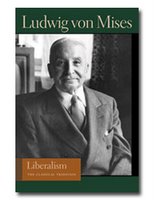Liberalism, por Ludwig von Mises
 Graças a uma excelente iniciativa do Mises Institute, foi reeditada em inglês a obra Liberalism, que constitui a meu ver o principal contributo de Ludwig von Mises para a teoria política. Apesar de nas décadas mais recentes se ter vindo a verificar um notável renascimento de interesse pelos contributos de Ludwig von Mises para a teoria económica, os seus trabalhos no âmbito da teoria política continuam a ser relativamente pouco conhecidos e estudados. É uma situação até certo ponto compreensível se tivermos em conta que Mises deu sempre prioridade à teoria económica e que a extraordinária notoriedade obtida por Hayek no âmbito do pensamento político contemporâneo tende, indirectamente, a ofuscar outras contribuições nessa área por parte de outros autores inseridos na tradição austríaca. Não obstante o facto de, em termos políticos, me encontrar mais próximo de Hayek do que de Mises, espero que esta nova edição em inglês contribua para alterar a situação atrás descrita permitindo que o paradigma misesiano receba mais atenção.###
Graças a uma excelente iniciativa do Mises Institute, foi reeditada em inglês a obra Liberalism, que constitui a meu ver o principal contributo de Ludwig von Mises para a teoria política. Apesar de nas décadas mais recentes se ter vindo a verificar um notável renascimento de interesse pelos contributos de Ludwig von Mises para a teoria económica, os seus trabalhos no âmbito da teoria política continuam a ser relativamente pouco conhecidos e estudados. É uma situação até certo ponto compreensível se tivermos em conta que Mises deu sempre prioridade à teoria económica e que a extraordinária notoriedade obtida por Hayek no âmbito do pensamento político contemporâneo tende, indirectamente, a ofuscar outras contribuições nessa área por parte de outros autores inseridos na tradição austríaca. Não obstante o facto de, em termos políticos, me encontrar mais próximo de Hayek do que de Mises, espero que esta nova edição em inglês contribua para alterar a situação atrás descrita permitindo que o paradigma misesiano receba mais atenção.###The world has waited for a reprint but at last it is here: Mises's classic statement in defense of a free society, in print again. Here is the text that has been the conscience of a global movement for liberty, and for 80 years.
It first appeared in 1927, as a followup to his devasting 1922 book showing that socialism would fail, and also as a followup to his 1926 book on interventionism.
It was written to address the burning question: if not socialism, and if not fascism or interventionism, what form of social arrangements are most conducive to human flourishing? Mises's answer is summed up in the title, by which he meant classical liberalism.
Mises did more than restate classical doctrine. He gave a thoroughly modern defense of freedom, one that corrected the errors of the old liberal school by rooting the idea of liberty in the institution of private property (a subject on which the classical school was sometimes unclear). Here is the grand contribution of this volume.
"The program of liberalism, therefore, if condensed into a single word, would have to read: property, that is, private ownership of the means of production... All the other demands of liberalism result from his fundamental demand."
But there are other insights too. He shows that political decentralization and secession are the best means to peace and political liberty. As for religion, he recommends the complete separation of church and state. On immigration, he favors the freedom of movement. On culture, he praised the political virtue of tolerance. On education: state involvement must end, and completely.
He deals frankly with the nationalities problem, and provides a stirring defense of rationalism as the essential foundation of liberal political order. He discusses political strategy, and the relationship of liberalism to special-interest politics.
In some ways, this is the most political book of Mises's treatises, and also one of the most inspiring books ever written on the idea of liberty. It remains the book that can set the world on fire for freedom, which is probably why it has been translated into more than a dozen languages.
How marvelous that it is finally available to English audiences again!
por André Azevedo Alves @ 2/02/2006 10:33:00 p.m.
![]()

<< Blogue